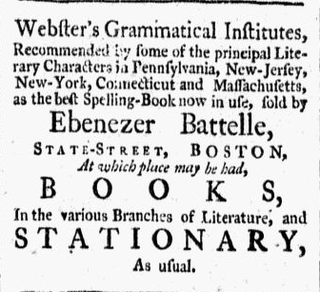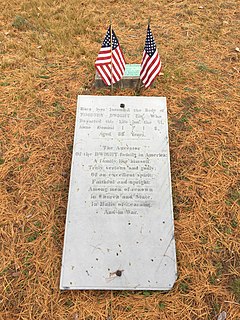Related Research Articles

Ebenezer Battelle (1754–1815) was an American Revolutionary War veteran, a bookseller in Boston, Massachusetts, and a settler of Marietta, Ohio, in the late 18th century.

The 1689 Boston revolt was a popular uprising on April 18, 1689, against the rule of Sir Edmund Andros, the governor of the Dominion of New England. A well-organized "mob" of provincial militia and citizens formed in the town of Boston, the capital of the dominion, and arrested dominion officials. Members of the Church of England were also taken into custody if they were believed to sympathize with the administration of the dominion. Neither faction sustained casualties during the revolt. Leaders of the former Massachusetts Bay Colony then reclaimed control of the government. In other colonies, members of governments displaced by the dominion were returned to power.
Ensign Daniel Fisher (1618-1683) was a politician from Dedham, Massachusetts and Speaker of the Massachusetts House of Deputies.
Lieutenant Joshua Fisher was a politician from Dedham, Massachusetts and a member of the Massachusetts House of Deputies. He was a blacksmith, saw mill owner, and tavern keeper.
Samuel Dexter (1726—1810) was an early American politician from Dedham, Massachusetts.
Captain Joseph Guild represented Dedham, Massachusetts in the Great and General Court. He was also town clerk for a total of four years, having first been elected in 1773. Additionally, he served seven terms as selectman, with his first election in 1768.
Ebenezer Fisher represented Dedham, Massachusetts in the Great and General Court. The Fisher School, now in Westwood, Massachusetts, was named in his honor. He served as selectman in 1785. He voted against the Norfolk and Bristol Turnpike as a member of the legislature in 1802. Fisher Ames was a driver for the road, and his brother Nathaniel believed his no vote made him a "traitor" motivated by "an ancient prejudice against the Old Parish," i.e. modern day Dedham.

Captain Timothy Dwight (1629–1718) represented Dedham in the Great and General Court of Massachusetts and was the progenitor of the Dwight family.
Michael Powell represented Dedham, Massachusetts in the Great and General Court in 1641 and 1648. His daughter, Sarah, married Timothy Dwight. He was also town clerk for a total of four years, having first been elected in 1643. He was a selectman for four years, beginning in 1641. He was the first tavern owner in Dedham.
John Hunting was Ruling Elder of the First Church and Parish in Dedham.
John Dwight was one of the first settlers of Dedham, Massachusetts and progenitor of the Dwight family.
Nathan Aldis was an early settler of Dedham, Massachusetts who served on that town's Board of Selectmen in 1641, 1642, and 1644. He served in a variety of other positions in the town and served as a deacon at First Church and Parish in Dedham. He signed the Dedham Covenant.
Francis Chickering was an early settler of Dedham, Massachusetts who served in the Great and General Court of Massachusetts and on that town's Board of Selectmen for 15 years. He was also a teacher in the first public school in America, today well known as the Dedham Public Schools.
Samuel Morse (1585-1654) was an original proprietor of Dedham, Massachusetts who served on the board of selectmen for two years. He was also a founder of Medfield, Massachusetts when it broke away from Dedham. He was elected a selectman before joining the First Church and Parish in Dedham. He was a signer of the Dedham Covenant.
Peter Woodward represented Dedham, Massachusetts in the Great and General Court in 1665, 1669, and 1670. He also served on the board of selectmen for 16 years, with his first term beginning in 1643 and his last ending in 1670.
Lieutenant Anthony Fisher represented Dedham, Massachusetts in the Great and General Court. He was also a selectman for three years.
Lt. Daniel Pond was a prominent early settler of Dedham, Massachusetts.
John Farrington was an early American colonist. He settled in Dedham, Massachusetts and served as a selectman there. When the town of Wrentham separated, he became one of the first settlers there. Later, he would become one of the founders of Deerfield, Massachusetts. His wife, Mary Bullard, was the cousin of Quentin Stockwell's wife Abigail. The Stockwells were also original settlers of Deerfield. He was the ancestor of Representative John Farrington.
The early government of Dedham, Massachusetts describes the governance of Dedham from its founding in 1636 to the turn of the 18th century. It has been described as being both "a peculiar oligarchy" and a "a most peculiar democracy." Most freemen could participate in Town Meeting, though they soon established a Board of Selectmen. Power and initiative ebbed and flowed between the two bodies.
Captain Aaron Fuller was an early American military official from Dedham, Massachusetts.
References
- 1 2 Worthington 1827, pp. 106–107.
- ↑ Worthington 1827, pp. 79–81.
- ↑ Abbott 1903, pp. 290–297.
- ↑ Hanson 1976, p. 99-100.
- ↑ Webb 1998, p. 192.
- ↑ Lustig 2002, p. 145, 197.
- ↑ "List of burials" (PDF). Dedham Village Preservation Association. Retrieved September 30, 2019.
- ↑ Smith 1936, p. 145.
- ↑ Goodwin 1982, pp. 40–41.
- ↑ Goodwin 1982, p. 41.
- ↑ Goodwin 1982, p. 40.